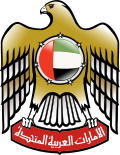Ministry of Human Resources and Emiratisation
| وزارة الموارد البشرية والتوطين | |
 Emblem of the UAE | |
| Agency overview | |
|---|---|
| Formed | 2004 |
| Jurisdiction | Federal government of the United Arab Emirates |
| Headquarters | Abu Dhabi, United Arab Emirates |
| Minister responsible |
|
| Parent department | Cabinet of the United Arab Emirates |
| Website | www |
The Ministry of Human Resources and Emiratisation (MoHRE) (وزارة الموارد البشرية والتوطين) is the federal ministry in charge of labour market regulation, workforce policy development, and promoting Emiratisation within the United Arab Emirates (UAE). The ministry also enforces employment legislation, manages labour relations, and oversees private sector compliance across the country's seven emirates.[1]
History
[edit]Establishment
[edit]Founded in 2004 as the Ministry of Labour and Social Affairs, it was restructured in 2006 into two separate ministries: the Ministry of Labour and the Ministry of Social Affairs.[2][3]
2016 Restructuring
[edit]In 2016, the ministry was renamed the Ministry of Human Resources and Emiratisation to reflect its expanded mandate under the UAE Vision 2021.[4]
Recent Developments
[edit]The ministry led emergency labour policies during the COVID-19 pandemic (2020), and introduced sweeping reforms to the Federal Labour Law in 2021.[5]
Mandate and Responsibilities
[edit]The ministry’s responsibilities fall under four core pillars:
1. Labour Market Regulation
[edit]Includes enforcement of employment contracts, dispute resolution, licensing recruitment agencies, and issuing work permits.[6]
2. Workforce Development
[edit]MoHRE supports skills training, workforce planning, job placement, and partnerships with education institutions.[7]
3. Worker Protection
[edit]Administers the Wage Protection System (WPS), ensures occupational health standards, and enforces employment rights for all workers.[8]
4. Economic Development
[edit]Supports the UAE's diversification agenda by promoting flexible labour policies and attracting skilled talent.[9]
Organisational Structure
[edit]MoHRE is divided into sectors such as:
- Inspection and Labour Relations
- Employment and Skills Development
- Policy and Strategy
- Digital Services and Smart Transformation[10]
Legal Framework
[edit]Key laws under MoHRE include:
- Federal Labour Law No. 33 of 2021
- Domestic Workers Law No. 10 of 2017
- Emiratisation Decrees[11]
Emiratisation Strategy
[edit]Approach
[edit]Focuses on job creation for Emiratis, mandatory quotas, training, and wage subsidies.[12]
Major Programs
[edit]- Nafis Program
- Tawteen Partners Club
- Career fairs and training workshops
Labour Reforms
[edit]Key Reforms
[edit]- Removal of No Objection Certificate (NOC)
- Implementation of fixed-term contracts
- Expansion of WPS and remote work policies[13]
Public Services
[edit]Digital and Physical Channels
[edit]Over 100 services are available through the MoHRE website, mobile app, Tasheel centers, call centers, and kiosks.[14]
Services For
[edit]- Employers: Permit issuance, inspections
- Workers: Contract validation, grievance redress
- Job Seekers: Placement, training, unemployment support
Leadership
[edit]As of 2025, the ministry is led by Dr. Abdulrahman Al Awar.[15]
International Engagement
[edit]MoHRE collaborates with organizations such as the ILO, UN Women, and GCC Labour Councils to promote ethical recruitment and international labour standards.[16]
Future Vision
[edit]MoHRE’s future plan (2023–2025) includes:
- AI-driven labour market analytics
- Sustainability initiatives
- Digital service expansion
- Workforce adaptation for Industry 4.0[17]
See also
[edit]External links
[edit]References
[edit]- ^ "About Ministry of Human Resources and Emiratisation". Ministry of Human Resources and Emiratisation. Retrieved 6 May 2025.
- ^ "UAE Cabinet Restructuring Creates New Ministries". Emirates News Agency. 11 February 2004. Retrieved 6 May 2025.
- ^ Al Suwaidi, Abdulla (2011). UAE Government: Structure and Development. Emirates Center for Strategic Studies and Research. pp. 87–89. ISBN 978-9948-14-643-2.
{{cite book}}: Check|isbn=value: checksum (help) - ^ "Mohammed bin Rashid announces UAE Government's new structure". Emirates News Agency. 8 February 2016. Retrieved 6 May 2025.
- ^ "UAE: New labour laws to go into effect in February 2022". Khaleej Times. 15 November 2021. Retrieved 6 May 2025.
- ^ "Recruitment Agency Licensing Requirements". Ministry of Human Resources and Emiratisation. Retrieved 6 May 2025.
- ^ UAE Labour Market Report 2023 (Report). MoHRE. March 2024. Retrieved 6 May 2025.
- ^ "Worker Protection Mechanisms". Ministry of Human Resources and Emiratisation. Retrieved 6 May 2025.
- ^ Ibrahim, Badr El Din (2020). The UAE Economy: Policies for Sustainable Growth. Palgrave Macmillan. pp. 178–183. ISBN 978-3-030-34294-8.
{{cite book}}: Check|isbn=value: checksum (help) - ^ "MoHRE Organizational Structure". MoHRE. Retrieved 6 May 2025.
- ^ "Federal Decree-Law No. 33 of 2021". MoHRE. Retrieved 6 May 2025.
- ^ "Emiratisation Strategy Framework". MoHRE. Retrieved 6 May 2025.
- ^ "New UAE labour law: All you need to know". Khaleej Times. 7 February 2022. Retrieved 6 May 2025.
- ^ "MoHRE Service Centers and Channels". MoHRE. Retrieved 6 May 2025.
- ^ "UAE Cabinet reshuffle sees new ministers appointed". The National. 25 September 2021. Retrieved 6 May 2025.
- ^ "UAE and India sign MoU on labour cooperation". Khaleej Times. 17 February 2023. Retrieved 6 May 2025.
- ^ "MoHRE Strategic Plan 2023-2025". MoHRE. Retrieved 6 May 2025.